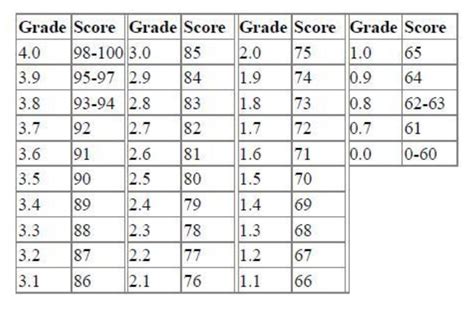The University of Wisconsin-Milwaukee (UWM) grading scale is an essential tool for students to understand their academic performance. This guide provides a comprehensive overview of the grading system, its implications, and strategies for achieving academic success.

Why the UWM Grading Scale Matters
Your grades serve as the primary measure of your academic progress and contribute directly to your overall GPA. A strong understanding of the grading scale allows you to:
- Track your performance and identify areas for improvement
- Predict your final grade and plan accordingly
- Meet the requirements for scholarships, graduate school, and future employment
The UWM Grading Scale at a Glance
The UWM grading scale consists of the following letter grades and numerical equivalents:
| Letter Grade | Numerical Equivalent |
|---|---|
| A+ | 4.0 |
| A | 4.0 |
| A- | 3.7 |
| B+ | 3.3 |
| B | 3.0 |
| B- | 2.7 |
| C+ | 2.3 |
| C | 2.0 |
| C- | 1.7 |
| D+ | 1.3 |
| D | 1.0 |
| D- | 0.7 |
| F | 0.0 |
Understanding Your Grade Point Average (GPA)
Your GPA is calculated as the average of all the letter grades you earn in your coursework. Each letter grade corresponds to a specific numerical value, as shown above. To calculate your GPA, multiply the numerical equivalent of each grade by the number of credits associated with the course. Then, divide the sum of the weighted grades by the total number of credits.
For example, if you earn the following grades in three courses:
- Course A: A+ (4.0) x 3 credits = 12.0
- Course B: B+ (3.3) x 3 credits = 9.9
- Course C: C- (1.7) x 2 credits = 3.4
Your GPA would be calculated as: (12.0 + 9.9 + 3.4) / (3 + 3 + 2) = 3.125
Implications of the UWM Grading Scale
The grading scale at UWM has several key implications for students:
- High grades are essential: A higher GPA can increase your chances of obtaining scholarships, entering graduate school, and securing competitive employment opportunities.
- Failing grades can have severe consequences: Failing grades can lead to academic probation or suspension, as well as a lower GPA, which can make it difficult to recover academically.
- Consistency is crucial: Aim for consistent performance throughout the semester to avoid relying on high grades in a few courses to offset lower grades in others.
Strategies for Academic Success
To achieve academic success under the UWM grading scale, consider the following strategies:
- Attend class regularly: Regular attendance is essential for absorbing course material and participating in discussions that contribute to your understanding.
- Complete all assignments on time: Submitting assignments on time demonstrates your commitment to your studies and ensures you receive credit for your work.
- Seek help early: If you are struggling with a course, don’t hesitate to seek help from professors, TAs, or tutoring services.
- Study effectively: Utilize active study methods, such as reading, taking notes, and practicing problems, to enhance your comprehension.
- Manage your time wisely: Create a schedule that balances academic responsibilities with other commitments to avoid feeling overwhelmed.
Common Mistakes to Avoid
Many students inadvertently hinder their academic progress by making common mistakes. Avoid the following pitfalls:
- Procrastination: Put off assignments until the last minute, leading to rushed, low-quality work and a higher risk of failure.
- Ignoring feedback: Failing to heed feedback from professors and TAs results in missing opportunities to improve your work and raise your grades.
- Overestimating your abilities: Assuming you can do well in a course without putting in sufficient effort often leads to disappointment and a lower grade.
- Underestimating the difficulty of a course: Taking on too many challenging courses simultaneously can overwhelm you and compromise your performance in all courses.
- Giving up easily: Encountering challenges in a course is common. Instead of quitting, persevere and seek help to overcome obstacles.
Conclusion
The UWM grading scale is a crucial tool for students to understand their academic performance and plan for their academic future. By familiarizing yourself with the grading system, setting achievable goals, and implementing effective study strategies, you can maximize your academic success and reach your full potential.
Additional Tips for Success
- Consider your learning style: Identify the study methods that work best for you and tailor your study habits accordingly.
- Set realistic goals: Break down large assignments into smaller, manageable chunks to maintain motivation and avoid feeling overwhelmed.
- Reward yourself for effort: Acknowledge your accomplishments and reward yourself for completing assignments and achieving milestones.
- Stay positive: Maintain a positive attitude and believe in your ability to succeed. Your mindset plays a significant role in your academic journey.
- Embrace feedback: View feedback as an opportunity for growth and make an effort to implement suggestions for improvement.
